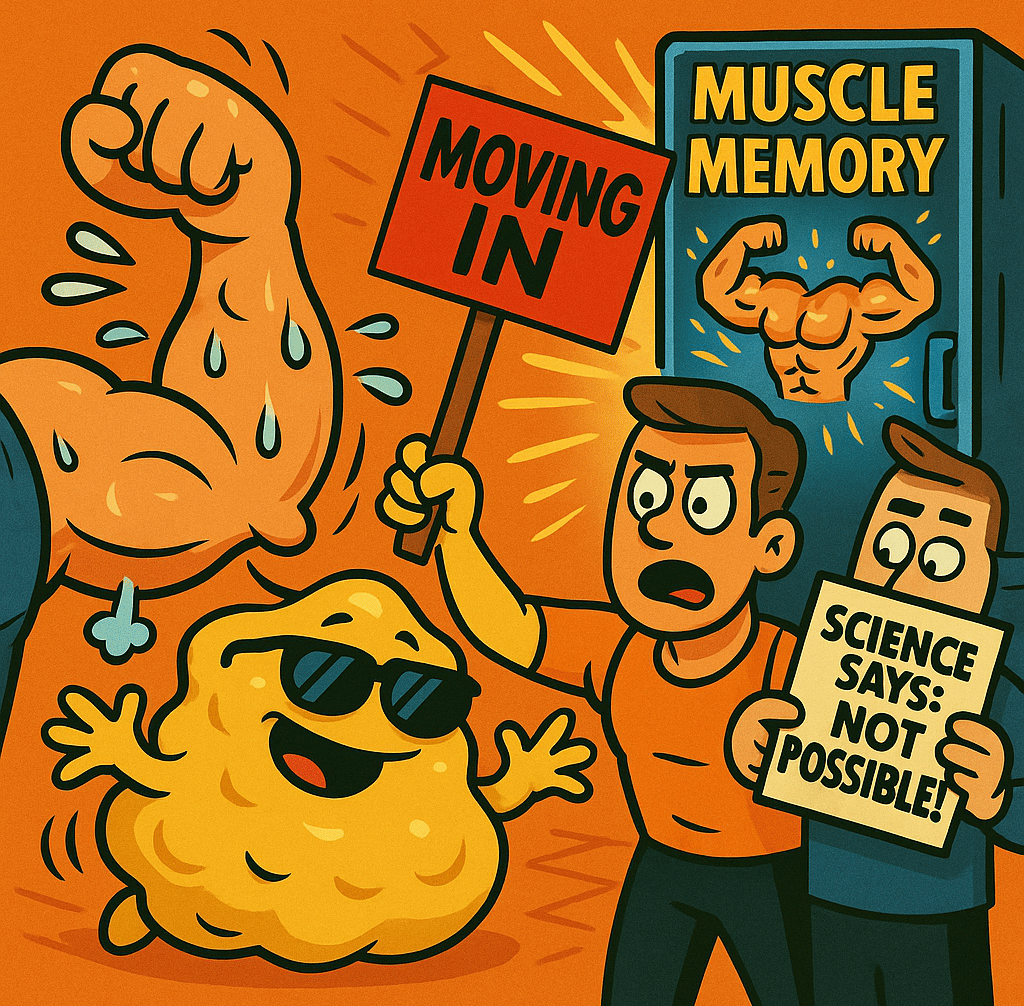Fitness Myth #10: “Muscle Turns Into Fat When You Stop Training”
Discover why muscle and fat are two different tissues, what really happens when you stop working out, and how muscle memory helps you bounce back faster. Funny, science-based, and easy to understand.
FITNESS
Adi English
3 min read


💪 Fitness Myth #10: “If You Stop Training, Muscle Turns Into Fat”
📖 Article (~370 words)
This one pops up in every gym conversation: “Careful, if you quit working out, your muscle will turn into fat.” Like muscle and fat are best friends just waiting to trade places. News flash: muscle and fat are completely different tissues. Muscle doesn’t shapeshift into fat, and fat doesn’t wake up one morning and decide to become biceps.
Here’s what really happens: when you train, you build muscle fibers that make you stronger and more defined. If you stop training, those muscles shrink because they’re not being used. This process is called atrophy. You also burn fewer calories when you have less muscle, which can make it easier to gain fat if your eating stays the same. But the fat isn’t your old muscle — it’s just your body storing extra energy you’re not using.
Think of it like this: a garage can hold either a car or boxes of junk. If you stop parking the car there, it doesn’t turn into cardboard boxes. You just stopped using it, and now the space gets filled with something else. Same with your body: muscle isn’t turning into fat, but when you lose one and gain the other, it looks like a swap.
The good news is that muscle has memory. When you start training again, your body rebuilds strength and size faster than the first time. With consistent resistance training, proper nutrition, and recovery, you can get back on track.
So no, skipping the gym for a month won’t magically turn you into the Stay Puft Marshmallow Man. You’ll lose some strength, maybe gain a little fat if diet isn’t adjusted, but nothing is morphing. Muscle is muscle. Fat is fat. They stay in their own lanes.
🗂 Vocabulary
Muscle fibers – the tiny parts of muscles that contract and create strength.
Simple: Small pieces that make muscles work.
Example: Training builds stronger muscle fibers.
Student example: ____________
Atrophy – shrinking of muscles when not used.
Simple: Muscles getting smaller.
Example: Muscles atrophy if you stop training.
Student example: ____________
Calories – units of energy from food.
Simple: The fuel your body uses.
Example: Muscles burn calories even at rest.
Student example: ____________
Energy – power your body uses to move or store.
Simple: What keeps you active.
Example: Fat stores energy for later.
Student example: ____________
Nutrition – food needed for health and growth.
Simple: Eating to support your body.
Example: Good nutrition helps recovery.
Student example: ____________
Resistance training – exercise using weights or resistance.
Simple: Training with load to build strength.
Example: Squats are resistance training.
Student example: ____________
Strength – the ability to lift or push weight.
Simple: Being physically strong.
Example: Strength improves with training.
Student example: ____________
Recovery – resting and repairing after training.
Simple: Healing after exercise.
Example: Sleep is important for recovery.
Student example: ____________
Shrink – to become smaller.
Simple: To get less in size.
Example: Muscles shrink if you stop using them.
Student example: ____________
Memory – the body’s ability to return to past strength.
Simple: Muscles remember training.
Example: Muscle memory helps you regain size faster.
Student example: ____________
📝 Exercises
Comprehension
What do people wrongly believe happens to muscle when you stop training?
What are muscle and fat actually made for?
What happens if you stop training but keep eating the same?
What is muscle memory?
What is the “garage” example explaining?
Multiple Choice
Muscle tissue is made
of: a) Fibers b) Fat c) Water d) Sugar
Fat’s main role is:
a) Movement b) Storage of energy c) Building fibers d) Healing injuries
Atrophy means:
a) Gaining fat b) Losing calories c) Muscles shrinking d) Eating too much protein
Muscle memory helps you:
a) Remember workouts b) Rebuild muscle faster c) Store more fat d) Burn more calories while resting
If you train less, what should you adjust?
a) Calories b) TV time c) Shoe size d) Water intake
Fill in the Blank
Muscle and fat are different types of ______.
Muscles can ______ if they aren’t used.
Extra ______ may lead to fat gain.
______ memory helps rebuild strength faster.
You should ______ your diet when training less.
True/False
Muscle can magically transform into fat.
Fat stores energy for the body.
Atrophy means muscles shrink from lack of use.
Muscle memory helps you regain muscle quicker.
The “garage” example shows fat turning into muscle.
Discussion
Why do you think people believe muscle turns into fat?
How can you prevent fat gain if you stop training for a while?
Have you experienced muscle memory yourself?
What’s more important when training less: eating fewer calories or staying active?
How would you explain this myth to a beginner at the gym?
